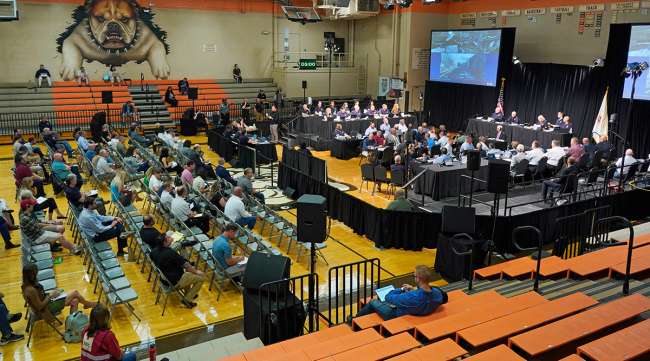Union Rep Says Norfolk Southern Has Cut Back on Inspections

[Stay on top of transportation news: Get TTNews in your inbox.]
OMAHA, Neb. — Freight railcar inspections are happening less often and are not as thorough as in years past due to staff cuts, time constraints and regulatory loopholes, a union official testified June 23 during a federal hearing to examine the reasons behind a fiery train derailment in Ohio.
The National Transportation Safety Board said in its preliminary report that an overheating wheel bearing likely caused the Feb. 3 Norfolk Southern derailment that sent a plume of toxic black smoke into the sky near East Palestine, Ohio. Several tank cars were damaged in the crash, and officials decided that five of them containing vinyl chloride needed to be blown open to release the chemical and prevent an explosion.
It’s not clear whether an inspector would have been able to catch that the bearing was failing because it is sealed within the railcar’s axle. No inspector was even given a chance.
Jason Cox with the Transportation Communications Union testified June 23 during the second day of the NTSB hearing (video) that the railcar that caused the derailment wasn’t inspected by Norfolk Southern even though it passed through three railyards where qualified inspectors were working.
Cox said the lack of inspections reflects the changes Norfolk Southern has made since 2019 to slash the ranks of car inspectors and other employees, and that the company increasingly uses a loophole in federal regulations to rely on train crews to complete inspections instead of experts trained to do that work. He said train crews look at just 12 points on a rail car instead of the 90 to 105 points a carman checks.

East Palestine, Ohio, resident Eric Cozza listens during the NTSB hearing. (Gene J. Puskar/Associated Press)
Furthermore, Cox said, carmen are pushed to inspect a car in just one minute instead of the roughly three minutes they had before the railroad starting making operational changes over the past four years. Norfolk Southern’s representative at the hearing, Jared Hopewell, denied the railroad has a time limit for inspections. Cox cited a deposition from a Norfolk Southern manager that confirmed a one-minute goal.
“This firewall of safety has been severely compromised,” Cox said during the hearing in East Palestine.
The NTSB’s final report on the derailment is not expected until at least a year after the derailment.
On June 22, first responders and others testified about the difficulties they encountered in identifying the train’s cargo, and reviewed why officials decided to release and burn the toxic chemicals. On June 23, residents, local officials and others are hearing testimony about the wheel bearings, trackside detectors and tank cars.

Guy Broderick of Kriska shares how he successfully combined data reports and a simple understanding of human nature to become one of the best driver coaches in North America. Tune in above or by going to RoadSigns.ttnews.com.
After officials released and burned the vinyl chloride in the days after the derailment, roughly half the 5,000 East Palestine residents had to evacuate their homes. State and federal officials have said the air and water around town is safe, but residents continue to worry about the long-term health effects from the derailment.
Norfolk Southern’s Hopewell and Mike Rush with the Association of American Railroads trade group that sets standards for the industry said railroads are taking the Ohio derailment seriously and making changes to prevent any future derailments, including adding hundreds more trackside detectors that are supposed to spot overheating bearings before they cause a crash.
The NTSB has said the overheating bearing triggered an alarm from one of those detectors in Ohio, but that the crew didn’t have a chance to stop the train before the derailment.
Rush said nearly every hazardous materials shipment that railroads haul arrives safely, but even one derailment involving those chemicals can be disastrous.
Want more news? Listen to today's daily briefing above or go here for more info
“The Feb 3 derailment is a stark reminder of the railroad industry’s responsibility to the communities in which we operate. The railroads are taking what happened here with the utmost seriousness,” Rush said.
Federal regulators and Congress have called on the industry to do more.
Members of the NTSB questioned the wisdom of letting the railroad industry largely self-regulate — AAR sets recommended standards — but Rush said federal regulators have input on the group’s rules.
The Environmental Protection Agency and Ohio officials continue to oversee the cleanup of contaminated soil and water.




